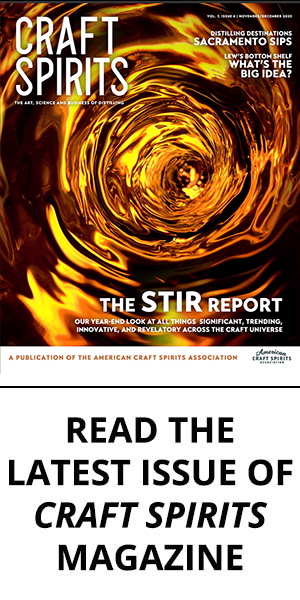
This column by Nicole Austin and Mark Shilling first appeared in the August 2019 issue of CRAFT SPIRITS magazine.
For those who don’t follow the wonky minutiae of federal rulemaking processes (although we can’t imagine why you wouldn’t!) you could easily have missed the recent proposed rulemaking from the Alcohol and Tobacco Tax and Trade Bureau (TTB).
If adopted, this gargantuan ‘modernization’ effort could transform the entire American spirits industry. In the proposal, TTB expressed a clear desire to simplify and modernize regulations that set the standards of identity for distilled spirits and generally control the information appearing on spirits labels (27 CFR Part 5), and therefore in a roundabout way greatly influence the types of spirits that will be produced in the U.S. This effort included some straightforward elements, like standardizing language, grouping things together in a sensible way, getting rid of antiquated rules, and utilizing more plain language. This is the most significant effort by the TTB in a generation to improve these complex and oftentimes confusing rules.
This modernization effort also included some real bombshells, such as limiting barrel sizes to approximately 50 gallons, redefining what it means to age a spirit, and updates to the rules around mandatory statements such as “produced by” and “distilled by.” To be clear, proposed rulemaking is just that: proposed. The TTB released its suggested changes for public comment this past fall with a 90-day window (later extended to June 26. At the deadline for public input, TTB had received well over a thousand submissions.
The American Craft Spirits Association recognized this as a key opportunity not only to comment on the specifics of the proposals, but also to express a clear position on the most effective structures for these regulations.
As the only registered national non-profit trade group representing the U.S. craft spirits industry, our comments will strongly influence the final rulemaking. We took this effort seriously, knowing it may shape the U.S. spirits industry for decades to come.
ACSA’s comments were guided by general principles around labelling that we believe best drive our mission “To elevate and advocate for the community of craft spirits producers.”
· Transparency is the best way to avoid misleading consumers
• Make wide room for innovation, with clarity and disclosure to avoid confusion
• Objective rules are more fair than subjective rules
• Rules should be enforced equally across all categories, segments and regions of the U.S., with all receiving equal scrutiny
• Regional identities should be controlled by the regions themselves
• Truthful and accurate statements of processes and compositions should be allowed to be communicated to consumers
These principles guided the positions taken on the numerous specific issues in the proposed rulemaking, all of which were agreed by the elected representatives on the ACSA Board of Directors.
TTB has indicated that the volume of responses and the complexity of the proposals will most likely lead to a series of final rulemakings in the coming months and years before the effort is completed. Based on their general indications, we hope to see the first of these within the year. As nothing has been issued publicly, TTB was not able to comment on the likelihood of any specific result, but it did comment that the proposed restriction on barrel sizes, noting that provision “went over like a lead balloon.” We are confident our voice was heard “loud and clear” on that one! The TTB also hinted at further consideration around issues of aging and maturation, so we can likely expect more proposed rulemakings and comment periods around those questions. We will continue to keep our members appraised of any updates.
Nicole Austin is a founding board member of the American Craft Spirits Association. Mark Shilling served as ACSA’s president from 2017-2018 and currently chairs the government affairs committee.


